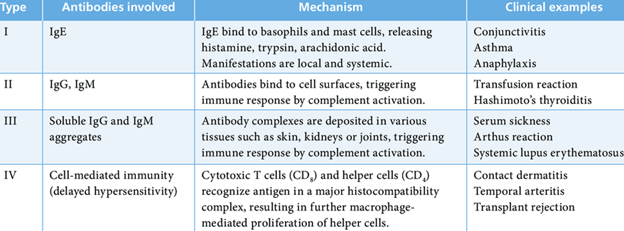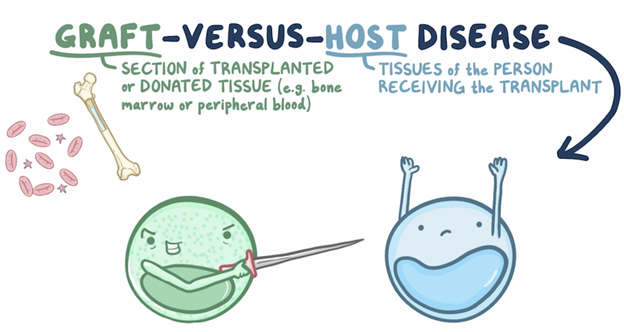Systemic lupus erythematosus is an example of which type of hypersensitivity reaction?
Type IV
Type III
Type II
Type I
The Correct Answer is B
A. Type IV Hypersensitivity (Delayed Hypersensitivity Reaction): This type of reaction involves a delayed immune response, typically occurring 24 to 72 hours after exposure to an antigen. It's characterized by the activation of T cells and macrophages, leading to inflammation. This type of hypersensitivity is often associated with conditions like contact dermatitis and some autoimmune diseases.
B. Type III Hypersensitivity (Antibody-Mediated Reaction): Type III hypersensitivity reactions occur when immune complexes, which are composed of antigens and antibodies, deposit in various tissues. This leads to inflammation and tissue damage. Systemic lupus erythematosus (SLE) is an example of a disease associated with Type III hypersensitivity.
C. Type II Hypersensitivity: This type of reaction involves antibodies (IgG or IgM) targeting antigens on the surface of cells. This can lead to cell destruction through various mechanisms, such as complement activation or antibody-dependent cell-mediated cytotoxicity (ADCC). Examples include hemolytic transfusion reactions and autoimmune hemolytic anemia.
D. Type I Hypersensitivity (Immediate Hypersensitivity Reaction): Type I hypersensitivity is characterized by an immediate immune response, typically occurring within minutes of exposure to an allergen. It involves the release of histamines and other mediators from mast cells and basophils, leading to symptoms like hives, respiratory distress, and anaphylaxis. Allergies, like hay fever and food allergies, are examples of Type I hypersensitivity reactions.

Nursing Test Bank
Naxlex Comprehensive Predictor Exams
Related Questions
Correct Answer is C
Explanation
A. Gentamicin: Gentamicin is an aminoglycoside antibiotic effective against many bacteria, but it's not the first choice for MRSA. Vancomycin or other alternatives are preferred due to the rising resistance of MRSA to gentamicin.
B. Nafcillin: Nafcillin is a penicillin antibiotic, often used for penicillin-sensitive staphylococcal infections. However, it is not effective against MRSA, which is resistant to many penicillin-based antibiotics.
C. Vancomycin: Vancomycin is a glycopeptide antibiotic used to treat a variety of bacterial infections, including MRSA. It works by inhibiting cell wall synthesis in bacteria, making it effective against Gram-positive bacteria that have developed resistance to other antibiotics like methicillin (which MRSA has).
D. Penicillin: Penicillin is a group of antibiotics that includes drugs like amoxicillin and ampicillin. MRSA is resistant to penicillin-based antibiotics, so they are not effective against MRSA infections.
Correct Answer is D
Explanation
A. Cushing's Syndrome: This is a condition caused by prolonged exposure to high levels of cortisol, a hormone produced by the adrenal glands. It is not related to kidney transplant or immunosuppressive therapy.
B. Hypersensitivity Reaction Type I: Also known as an immediate hypersensitivity reaction or an allergy, this type of reaction involves the immune system's exaggerated response to an allergen. Symptoms can range from mild to severe and occur quickly after exposure to the allergen. While allergies can cause various symptoms, they do not specifically represent rejection of a transplanted organ.
C. Chronic Graft Versus Host Rejection: This term is commonly associated with bone marrow or stem cell transplants. It occurs when immune cells from the donated tissue recognize the recipient's body as foreign and attack various organs or tissues. This process typically happens over a more extended period and is not directly related to the scenario described.
D. Acute Host Versus Graft Rejection: This occurs when the recipient's immune system recognizes the transplanted organ as foreign and launches an immune response against it. It can happen shortly after transplantation if the recipient's immune system is not adequately suppressed. In this case, stopping immunosuppressive therapy can trigger acute rejection, leading to the failure of the transplanted organ.

Whether you are a student looking to ace your exams or a practicing nurse seeking to enhance your expertise , our nursing education contents will empower you with the confidence and competence to make a difference in the lives of patients and become a respected leader in the healthcare field.
Visit Naxlex, invest in your future and unlock endless possibilities with our unparalleled nursing education contents today
Report Wrong Answer on the Current Question
Do you disagree with the answer? If yes, what is your expected answer? Explain.
Kindly be descriptive with the issue you are facing.
